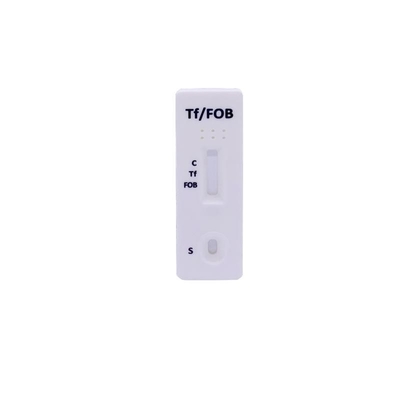

Transferrin and FOB Combo Rapid Test, Tumor Marker Rapid Test,Chromatographic Immunoassay
| Product features | Parameters |
| Principle | Chromatographic Immunoassay |
| Format | Cassette |
| Specimen | Feces |
| Certificate | CE |
| Reading Time | 5 minutes |
| Pack | 25 T |
| Storage Temperature | 2-30°C |
| Shelf Life | 2 Years |
| Cut-Off | Ref. Analytes |
A rapid, one step test for the qualitative detection of human hemoglobin and transferrin in human feces CE certified
Applications:
The Transferrin/FOB Combo Rapid Test Cassette is a rapid chromatographic immunoassay (non-invasive assay) for the qualitative detection of human hemoglobin and transferrin in human feces specimens, which might be useful for the diagnosis of bleeding gastrointestinal disorders.
Description:
Colorectal cancer is cancer that occurs in the colon or rectum, and affects both men and women of all racial and ethnic groups, and is most often found in people aged 50 years or older. For men, colorectal cancer is the third most common cancer after prostate and lung cancers. For women, colorectal cancer is the third most common cancer after breast and lung cancers.
Fecal occult blood should be an important indicator in the diagnostic evaluation of patients with suspected gastrointestinal bleeding of any etiology, not just as an indication of colorectal cancer. The presence of human hemoglobin in feces is inadequate as a screening test for stomach cancer (upper gastrointestinal disorders), because of human hemoglobin derived from the upper digestive tract is broken down in the intestinal tract (the antigenicity is lost).
Detection of fecal transferrin, which is more stable in stool than hemoglobin, provides an alternative way of diagnosing the disease in the upper digestive tract.
Blood in the stool may be the only symptom of cancer, but not all blood in the stool is caused by cancer. Other conditions that can cause blood in the stool include: Haemorrhoids, Anal fissures, Colon polyps, Peptic ulcers, Ulcerative colitis. Gastroesophageal reflux disease (GERD). Crohn's disease, use of non-steroidal anti-inflammatory drugs (NSAIDs).
How to use?
Allow the test, specimen, buffer and/or controls to reach room temperature (15-30°C) prior to testing.
To collect fecal specimens:Collect feces in a clean, dry specimen collection container. Best results will be obtained if the assay is performed within 6 hours after collection. Specimen collected may be stored for 3 days at 2-8°C if not tested within 6 hours.
INTERPRETATION OF RESULTS
(Please refer to the illustration above)
Transferrin POSITIVE:* Two lines appear. One colored line should be in the control line region (C) and another apparent colored line should be in the Transferrin line region (Transferrin).
FOB POSITIVE:* Two lines appear. One colored line should be in the control line region (C) and another apparent colored line should be in the FOB line region (FOB).
FOB and Transferrin POSITIVE:* Three lines appear. One colored line should be in the control line region (C) and another two lines appear in the FOB and Tf regions.
*NOTE: The intensity of the color in the test line region (T) will vary depending on the concentration of human hemoglobin and/or human transferrin present in the specimen. Therefore, any shade of color in the FOB and/or Tf region should be considered positive.
NEGATIVE: One colored line appears in the control line region (C). No line appears in the FOB and Tf region.
INVALID: Control line fails to appear. Insufficient specimen volume or incorrect procedural techniques are the most likely reasons for control line failure. Review the procedure and repeat the test with a new test. If the problem persists, discontinue using the test kit immediately and contact your local distributor.
Order Information
| Cat. No. | Product Description | Specimen | Format | Kit Size | Cut-Off | Status |
| TTFC-625 | Transferrin and FOB Combo Rapid Test Cassette | Feces | Cassette | 25 T | See Insert | CE |